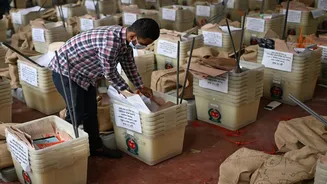Global Economic Climate
The global economic landscape presents a mixed picture, filled with various challenges. Several major economies grapple with inflation, supply chain disruptions,
and geopolitical tensions. These external pressures have the potential to impact growth across the world. However, the Indian economy has shown notable resilience. The Reserve Bank of India (RBI) has noted that India is not entirely immune to these global economic challenges. The interplay of interconnected global factors, such as commodity prices, fluctuations in the financial markets, and the lingering effects of the pandemic, are all affecting economic dynamics. The RBI's assessment implies that while these challenges are real, India is well-positioned to navigate them, thanks to its underlying economic strengths and the proactive measures taken by policymakers. These measures include fiscal policies, monetary policies, and strategic initiatives designed to cushion the impact of external shocks.
India's Resilience Factors
Several fundamental strengths contribute to the Indian economy's resilience. One key factor is the country's diverse and robust domestic market. India’s large population and expanding middle class drive significant domestic consumption. This internal demand acts as a buffer against external shocks. Additionally, the government's focus on infrastructure development, including roads, ports, and digital infrastructure, is boosting economic activity and productivity. Furthermore, India’s economic reforms, such as the Goods and Services Tax (GST), have streamlined business processes and improved the overall economic environment. The emphasis on digital transformation is also notable, leading to increased efficiency across various sectors. The RBI's report likely highlights these elements, emphasizing how they shield India from negative external impacts, fostering stability and sustained growth. The report probably also covers the role of financial sector strength and responsible fiscal management in fortifying the economy.
Inflation Management Strategies
Inflation is a significant concern in the current global economic context, and the RBI's approach to managing it will be crucial. The central bank employs various monetary policy tools to keep inflation under control. These tools include adjusting the repo rate, which is the rate at which commercial banks borrow from the RBI. The RBI also actively manages liquidity in the market to influence borrowing costs and control the money supply. Another critical aspect is the RBI's communication strategy. By clearly communicating its inflation targets and policy decisions, the RBI helps to manage expectations and ensure that businesses and consumers make informed decisions. These factors influence price stability, a crucial element for sustained economic growth. The RBI's ongoing efforts to maintain price stability are central to ensuring economic resilience. Its approach balances the need to combat inflation with the need to support economic activity.
Fiscal Policy Support
Alongside monetary policy, the government's fiscal policies play a pivotal role in supporting the economy. The Union government often implements measures aimed at boosting economic activity and providing relief during times of stress. These measures may include increased public spending on infrastructure, tax incentives for businesses, and targeted support for specific sectors. The government's fiscal stance, including its borrowing and spending plans, influences overall economic growth and stability. A well-managed fiscal policy complements the RBI’s monetary policy efforts. Coordination between the RBI and the government is essential for effective economic management. Fiscal measures support economic resilience by stimulating demand, creating jobs, and encouraging investment. Government spending also serves as a safety net, protecting vulnerable segments of the population during periods of economic uncertainty. Such proactive, coordinated approaches are designed to minimize the impact of external economic headwinds.
Future Economic Outlook
Looking ahead, the Indian economy faces a complex set of challenges and opportunities. The global economic environment will continue to evolve, with new developments emerging regularly. India's ability to sustain its growth momentum will depend on several factors, including its resilience to external shocks, its commitment to economic reforms, and its ability to manage inflation. Investments in education, healthcare, and skills development will be vital to enhance productivity and competitiveness. The country's strong fundamentals and proactive policies provide a solid foundation for future growth. Maintaining focus on these aspects is expected to strengthen India's position on the global stage. Economic forecasts often involve assessing various factors, from global market trends to domestic policy initiatives, to arrive at an informed outlook. The RBI's future outlook is likely to offer key insights into the challenges and opportunities that lie ahead for the Indian economy.















